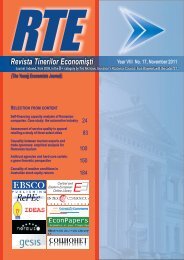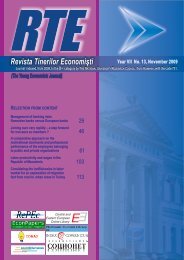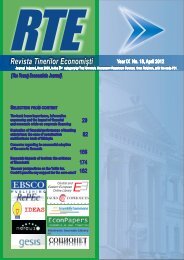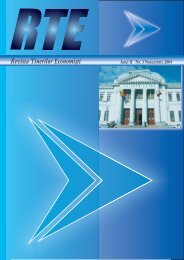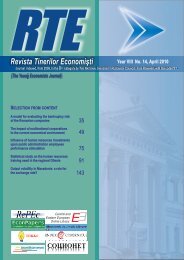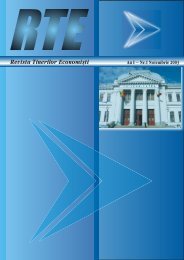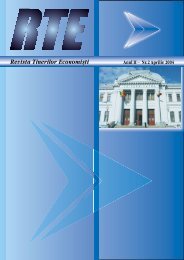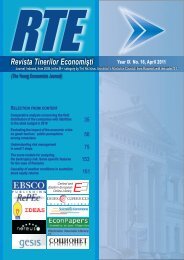Implications of change management in public administration
Implications of change management in public administration
Implications of change management in public administration
You also want an ePaper? Increase the reach of your titles
YUMPU automatically turns print PDFs into web optimized ePapers that Google loves.
Management – Market<strong>in</strong>g - Tourism<br />
In conclusion, we believe that the four conditions are rarely simultaneously and<br />
totally fulfilled, and this makes us repeat our hypothesis that the group decision-mak<strong>in</strong>g<br />
is purely theoretical.<br />
3. Involvement Of The Romanian Smes Employees In The Decision-Mak<strong>in</strong>g<br />
In the Romanian SMEs group decision/mak<strong>in</strong>g (not only <strong>in</strong> its narrow mean<strong>in</strong>g<br />
as we previously def<strong>in</strong>ed but also with a broader mean<strong>in</strong>g – the multi-personal decision)<br />
is not very frequent. In what follows we will try to argue as solidly as possible this fact<br />
by analyz<strong>in</strong>g the discourses <strong>of</strong> some successful Romanian entrepreneurs. For this<br />
reason we will focus on an ample aspect, i.e. the <strong>in</strong>volvement <strong>of</strong> the employees <strong>in</strong> the<br />
decisional processes which also <strong>in</strong>cludes group decision.<br />
In the majority <strong>of</strong> the papers on the SMEs, the manager is the central element <strong>in</strong><br />
the <strong>management</strong> processes, a decisional quasifactotum. The <strong>management</strong> style <strong>of</strong> SMEs<br />
is usually considered as very centralized, sometimes exclusively deta<strong>in</strong>ed by only one<br />
person, the owner-manager. Torres (1999) uses <strong>in</strong> this sense the term “ego firm”, <strong>in</strong><br />
order to def<strong>in</strong>e the small bus<strong>in</strong>ess. Thus, Torres proposes three characteristics for the<br />
SMEs:<br />
●“The butterfly effect” supposes that any apparently m<strong>in</strong>or problem can lead<br />
to a series <strong>of</strong> consequences <strong>in</strong> the <strong>in</strong>side <strong>of</strong> a SME because <strong>of</strong> its economic<br />
vulnerability. W. Torres quotes the follow<strong>in</strong>g situations that might affect the existence<br />
<strong>of</strong> the firm: a new competitor enters the market; the bankruptcy <strong>of</strong> a supplier, the refuse<br />
<strong>of</strong> a bank loan. Also, the actual <strong>management</strong> is frequently confronted with emergency<br />
situations which can turn <strong>in</strong>to real crisis.<br />
● “micro-cosmos effect” supposes that the manager be concerned with shortterm<br />
problems, strictly referr<strong>in</strong>g to micro-environment <strong>of</strong> the firm.<br />
● “egocentrism effect” highlights the hypertrophy <strong>of</strong> the manager‟s ego. As the<br />
manager is very concerned about himself, he cannot authorize (correctly) decision<br />
tak<strong>in</strong>g.<br />
A vicious circle bounds these three characteristics: “the egocentrism effect” and<br />
the “micro-cosmos” one alter the lucidity <strong>of</strong> the owner-manager. This <strong>in</strong>creases the<br />
vulnerability <strong>of</strong> the company and set <strong>of</strong>f/ accentuates the “butterfly effect” thus<br />
determ<strong>in</strong><strong>in</strong>g the owner-manager to <strong>in</strong>volve <strong>in</strong> the company function<strong>in</strong>g (<strong>in</strong>creas<strong>in</strong>g the<br />
“egocentrism effect”). By <strong>in</strong>creas<strong>in</strong>g the work volume, the owner-manager obviously<br />
takes more decisions (which can lead to an “effect <strong>of</strong> micro-cosmos”).<br />
Nevertheless, there are authors (Kalika, 1984) who consider that the degree <strong>of</strong><br />
centralization varies from one company to another be<strong>in</strong>g <strong>in</strong>fluenced by the company<br />
largeness, by the manager‟s personality and by the employees‟ value.<br />
Another idea (a preconception an outdated idea) very present <strong>in</strong> most papers<br />
on SMEs mentions that the manager is like a “solitary wolf” (he sees what the others<br />
cannot see, he does what the others cannot do) and, more than that, the entrepreneurial<br />
action cannot be performed as long as it is <strong>in</strong>dividual.<br />
Hatchuel (2000) argues that, <strong>in</strong> fact, <strong>in</strong> order to create a company, the manager<br />
is not and could not be by himself. In this direction, <strong>in</strong> the recent years it has been<br />
developed a reach literature talk<strong>in</strong>g about equipreneurship, team entrepreneurship,<br />
entrepreneurial teams (see Ben Hafaïedh, 2006).<br />
In what follows, tak<strong>in</strong>g <strong>in</strong>to account these elements, which can serve as the<br />
framework for analyz<strong>in</strong>g the existence/development <strong>of</strong> the group decisional processes<br />
101



